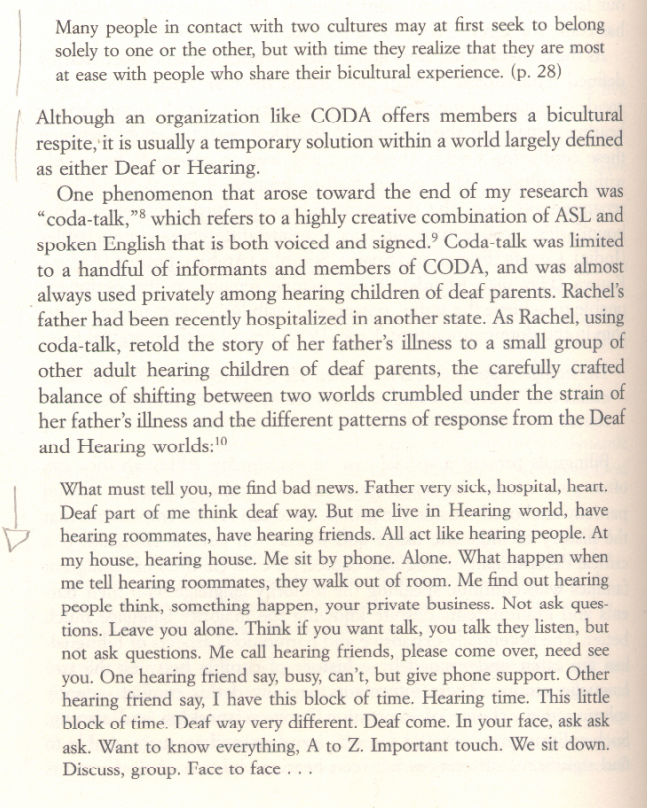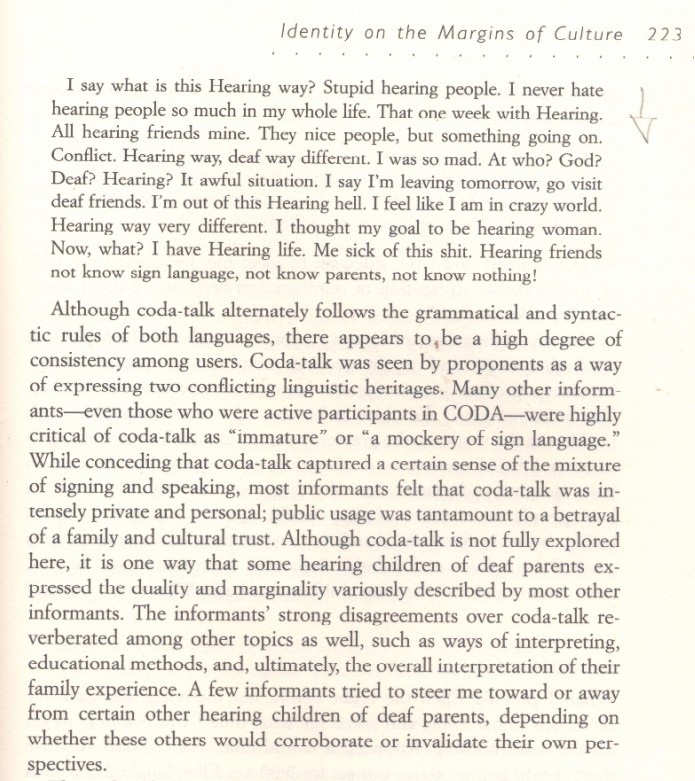Deaf Culture: Response to Grief |
Short excerpt from "Mother Father Deaf" by Paul Preston |
"Through stories, family histories, and sensitive questioning, Preston reveals what it feels like to stand astride the two communities and offers new insights into the world of deafness." (Booklist)I'm not claiming any special knowledge of Deaf Culture; I'm only presenting a short statement by a CODA. The statement seems to give a special insight into Hearing and Deaf Cultures. First some background is needed. Preston's book is a marvelous study of CODAs, including all the ramifications of their position within both cultures. Preston is himself a CODA. In the most typical circumstance a deaf individual is born to hearing parents. If the deaf person is profoundly deaf (which is of the most interest here), the parents often have difficulties raising the child. In the past such children ended up in special residential schools for the deaf. In these schools, deaf couples would meet, they would eventually leave the school and go out into the world, and in the fullness of time they would have children of their own. The most common outcome is for the child to have normal hearing, that is, the child is a CODA. There is a full cycle here: the grandparents are hearing and often have relatively little (or no) interaction with their deaf children. The new hearing child normally learns ASL (American Sign Language) from the parents, and learns English on the street and in schools. The CODA can communicate with the parents (and their deaf friends) on an equal footing with any other deaf person. The child can communicate with the grandparents again like any other hearing child, and is sometime especially welcomed by grandparents who were disappointed by their deaf children. CODAs usually have special demands placed on them. They may serve as interpreters from an early age. They may need to help their parents in a struggle with the hearing world, sometimes helping with matters that a child would normally not have to deal with. As Preston presents individual cases, the outcomes are all over the place. Some CODAs like being in both cultures, some like or hate one or the other culture. Some are very happy (even with the extra responsibilities they often have to shoulder) and some are unhappy. ASL has many of the characteristics of a normal spoken language, with a great ability to convey subtle ideas and meanings. At the base, ASL is completely different from English in all respects. (Some concepts need an English word, which might be spelled out with "fingerspelling".) Perfect fluency in ASL is as hard to acquire as with any other language. A CODA often learns ASL as their first language, well before learning English. (Not all deaf use ASL and not all CODAs know ASL.) The Deaf Culture is completely different from the Hearing Culture. For an outsider, it is an impenetrable mystery. Outsiders are hearing people who don't know ASL; insiders are deaf people who can sign ASL. A CODA has an immediate entry into the innermost areas of this society and culture. For the Deaf, the Hearing Culture is also the same kind of mystery, impossible to understand. To further complicate the quotation below, the CODA (Rachel, which is a pseudonym) is speaking in "Coda-talk", which is described on the first page. Rachel is a fluent native English speaker (despite the coda-talk), and is also able to communicate perfectly with deaf people in ASL. She is sad because of her father's illness. She has hearing friends and deaf friends. The two groups respond differently to her need for emotional support. Keep in mind that this is the reaction of a single individual to a stressful situation. Preston's book is full of other stories completely different from this one. (The excerpt is from pages 222-223 of Preston's book.)

| |

|